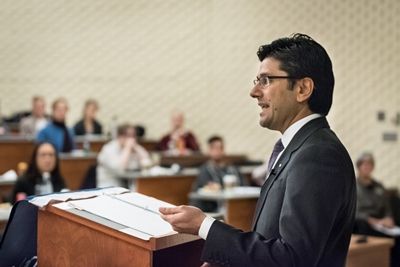
“I’m a bit of an agitator,” says Yasir Naqvi, the Attorney General of Ontario, who spoke to Queen’s Law students on February 8. He used his time to ask future lawyers to meet systemic problems head-on and to speak about the responsibility of lawyers and public servants to challenge the status quo.
One such problem area is the pace of criminal justice. The recent Supreme Court decision in R v Jordan sounded the alarm that the criminal justice was taking too long. “The decision is a game-changer,” said Naqvi. “I’ve had conversations with my colleagues from all provinces and territories, including the federal Minister of Justice, and we are all paying attention to the Jordan decision and how it impacts our criminal justice system.”
In response, the Ontario government is appointing new judges, increasing funding to Legal Aid Ontario for new duty counsel and hiring new Crown attorneys and support staff. It is also changing the bail system so that people who are not a threat to public safety can await their proceedings in the community. “We are expanding the bail supervision program province-wide so that there will be more support options available for low risk vulnerable people.”
Naqvi also talked about the friction between the law and changing social norms. “It works to reshape the justice system and causes it to evolve in new directions,” he explained. The examples he used were assisted reproduction, recreational use of cannabis and police oversight and the Ontario government’s response to each of those changes.
“When you begin practice and throughout your career you will face many such challenges,” concluded Naqvi. “Always ask the question: can it be done better? Our role as officers of the court extends to the entire system and part of the responsibility is to uphold the rule of law. All of you will have a stake in the justice system and the opportunity to change it so that it works better for the people who interact with it on a daily basis.”
By Anthony Pugh